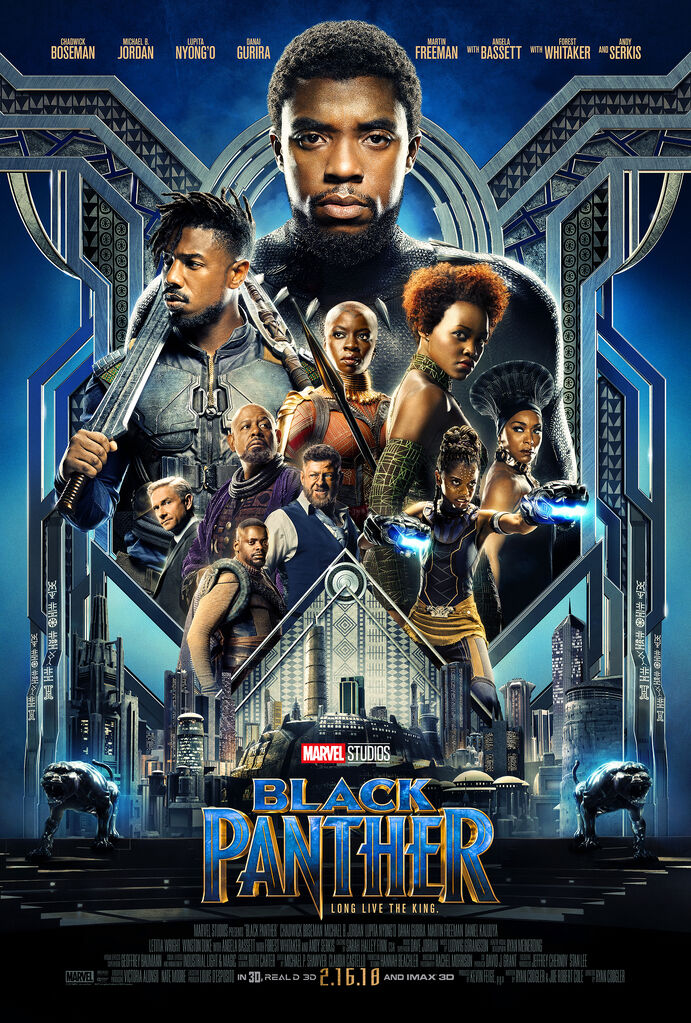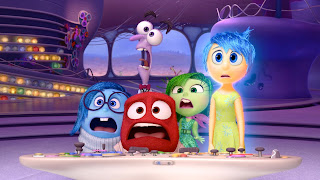 |
| Ryan Coogler's Black Panther was primed for a Best Picture nomination. |
Black Panther was going to be nominated for Best Picture. Ryan Coogler’s film was going to be the first superhero movie to be nominated for the film industry’s highest award, a lesser writer might even have proclaimed it the Jackie Robinson of superhero films. Then the Academy announced this year would feature a new award to honor the best popular film, & this breakthrough has been thrown into doubt.
To be sure, my previous belief in Black Panther’s Oscar inevitability is not universally held (though I'm not alone either). In March I posted in a Facebook group dedicated to pop culture that I would be surprised if it didn’t nab a Best Picture nomination and was met with a lot of skepticism (as seen below). So let me lay out the case.
 |
| Not everyone's a believer. |
It should be easy to recognize that the idea of the film being “too black” is ridiculous. Since the Academy’s expansion of Best Picture in 2009 a film with a black lead has been nominated in seven of nine years, even in the midst of the 2014-15 #OscarsSoWhite period Selma grabbed a nomination (It should’ve had a lot more), with 12 Years a Slave & Moonlight winning it all. And for those who question how many stories about persons of color the Academy would be willing to recognize with Spike Lee’s BlacKkKlansman & Barry Jenkins’ If Beale Street Could Talk both set to be contenders it’s important to remember that 2017 didn’t just see Jenkins’ Moonlight win, but Fences, Hidden Figures, & Lion get nominated as well. That year may be an exception at this point, but with the Academy’s continued work to diversify their membership it’s unlikely it will remain so.
Still, there’s a point to be made that most of those movies are Academy friendly in a way Black Panther is decidedly not. 12 Years a Slave & Hidden Figures are based on true stories, Fences was adapted from an award winning play, & while Moonlight’s win was surprising a nomination for an exquisitely filmed indie about a man struggling to deal with his sexuality & cultural expectations of masculinity didn’t blow people’s minds. But then Get Out happened.
 |
| Get Out broke down barriers of race & genre. |
Get Out is a horror satire, not exactly the go to genre for Oscar nominations. It came out in late February, a time of year known for studios dumping out their trash (The Great Wall & Fist Fight both opened in the top 5 the week before Get Out debuted), not awards hopefuls. It was written & directed by a first time director, in an industry that often demands people pay their dues. Its villains are white liberals who claim not to be racist, but are determined to not only uphold but to further the benefits of living in a white supremacist society -- a critique that could be leveled at a significant amount of Hollywood. Despite all of this Get Out managed four Oscar nominations, including Best Picture. Peele became only the third director to be nominated for his debut film (Only Hollywood legends Warren Beatty & James L. Brooks preceded him), & the first black winner of the Best Original Screenplay. Get Out proves that, if a film is good enough, the racial & genre barriers within the Academy can be broken down.
“Sure, but a smart horror movie isn’t the same thing as superhero movie,” the doubters would say, & they wouldn’t be wrong. While rare, horror films have crashed the Oscar party before, be it The Exorcist or The Sixth Sense, while superheros have been left out. The Dark Knight’s omission prompted the Academy to expand the number of Best Picture nominees from 5 to 10,* but that didn’t help The Dark Knight Rises get in. For the first time since The Dark Knight, the Producers Guild of America nominated superhero movies for their Best Picture award each of the last two years, yet neither Deadpool or Wonder Woman was recognized by the Academy. The former’s case doesn’t really apply to Black Panther, a friend accurately described it as akin to “frat bro adlibs,” but comparisons to Wonder Woman feel inevitable.
*The number of BP nominees can now be anywhere from 5 to 10, though it’s been either 8 or 9 films every year since that rule was implemented.
Both films broke ground, and set the box office aflame. While neither was actually the first superhero film to feature a black or female protagonist it had been a decade since either had seen the screen & they made clear that had been a mistake. Rather than a hindrance at the box office a superhero who wasn’t another square jawed white dude was a boost. Yet despite strong reviews, a huge box office, & laudits for stars Gal Gadot & Chris Pine, & director Patty Jenkins, Wonder Woman didn’t garner a single Oscar nomination. This would seem to discourage the idea of Black Panther being an Oscar frontrunner, but there are some key difference between the films.
Wonder Woman was a huge movie, $400 million plus domestically, making it the fourth highest grossing movie of 2016. Black Panther has made over $700 million in the United States. SEVEN HUNDRED MILLION!!! That’s the third highest gross of all-time. And while I don’t want to diminish Wonder Woman’s cultural significance, because it was huge, it’s not on the level of Black Panther. Wonder Woman gave us a hero little girls could luck up to, Black Panther likewise gave us a hero little black boys could look up to, plus three women of color girls could aspire to be like (most notably Shuri), & a black villain who wasn’t demonized but rather given a perspective audiences could understand & even empathize with. It was all encompassing, down to the way the film was designed to represent cultures across Africa. Most importantly though, for our purposes, it’s a better movie.
 |
| Black Panther is filled with memorable characters. |
Black Panther goes beyond the platitudes of responsibility or the power of love that run through so many superhero films, examining questions about the responsibilities of world superpowers, the damage inflicted by colonialism, the idea of black revolution, & the pain of losing one’s parents and culture. To say it has more thematic depth than the majority of Best Picture nominees from any given year would be an understatement. Writer/Director Ryan Coogler gives Wakanda a real sense of place, the Korea fight is incredible filmmaking, & he understands both that the best superhero films are driven by a protagonist & antagonist with conflicting worldviews (see: The Dark Knight), & that their final battle should be contained & personal. Lastly, Michael B. Jordan’s performance is a tour de force not seen in a blockbuster film since Heath Ledger’s turn as the Joker. It has all of the ingredients to be the The Dark Knight’s heir as the film to earn Best Picture, especially after Logan slashed a hole in the Academy’s anti-superhero walls by earning a Best Adapted Screenplay nomination last year. Or at least it did, until ABC threw a wrench into everything.
As the only major network without the NFL to boost its ratings the Oscars are ABC’s flagship event. With last year’s Oscars drawing the fewest viewers since viewership was first measured in 1974, & 2017’s being the lowest rated in nearly a decade, it’s understandable that ABC would be concerned. Working to shorten the broadcast to three hours, & moving the date the awards are held up the start of February, are reforms that make sense. No one wants to watch a four hour broadcast, & awards season was too long, but that wasn’t enough for them. They knew that ratings are driven up when hit movies are up for major awards. Titanic’s coronation garnered the highest ratings of the last forty years, & the best ratings of this decade came when Avatar & Gravity were major contenders for Best Picture (both rightfully lost). So they pressured the Academy into adding a best popular movie category.*
*It should be noted that ABC is owned by Disney, who owns the Marvel films, & who also just purchased 20th Century Fox. They would figure to be the dominant player in the popular film category.
In some respect I can empathize with this. Some Academy voters are too dismissive of popular entertainment, & I certainly would’ve preferred a battle between 2017 hits Dunkirk & Get Out to the one we got between The Shape of Water & Three Billboards Outside Ebbing, Missouri.* But the answer to these problems is not an award explicitly for popular movies. It lessens the awards in general, making them more akin to nonsense like the People’s Choice Awards or MTV Movie awards. There’s little reason to believe it will cause lasting ratings success as the driving force behind ratings hasn’t been popular films being nominated but rather their being real contenders to take home the grand prize, &, compounding that, it lessens the chances of a blockbuster being nominated for & winning Best Picture.
*Granted "Lady Bird" was the better then them all.
Foreign language films, animated films, & documentaries all have their own distinct categories at the Academy Awards, between them they have twelve all-time nominations for Best Picture. Since the Academy went to its current Best Picture Format in 2011 sixty-one films have been nominated for Best Picture, one of them was a foreign language film (Amour), none were animated or documentaries. I’m not going to tell you if they didn’t have their own awards we’d be flooded with animated or foreign language films or documentaries in the Best Picture category, but I’d bet hard money we’d have more. When you allow voters to say, “I loved Inside Out, but it’ll win Animated Picture,” you not only allow prevent them from challenging the idea that an animated film isn’t something that belongs in the Best Picture field, you reinforce it.
 |
| My reaction to Inside Out not being nominated for BP in 2016. |
Now that doesn’t mean we should get rid of those categories. Animation & documentaries are distinct from live action narrative films, & both foreign language films & documentaries are underseen & benefit greatly from the publicity of being nominated, but none of that applies to blockbusters. They’re not different enough to deserve their own award, & they don’t need the extra eyeballs, so there’s no benefit, but it will absolutely be easier for voters to dismiss them. It will be easier for them to look at Black Panther & dismiss it as a Best Popular Movie & not a Best Picture.
That doesn’t mean that Black Panther chances are dead. It’s still a massively successful film that got fantastic reviews & changed the cultural landscape of film (which will be true regardless of its rewards success or lack thereof). The Academy’s membership is still becoming younger & more diverse than ever before. It could still breakthrough, but the odds against it have grown, as have those against future popular action, comedy, & horror films, all because the Academy buckled to ABC’s short-sighted greed.
 |
| The new Oscar rules may hurt Black Panther's awards chances, but its legacy is secure. |
No comments:
Post a Comment